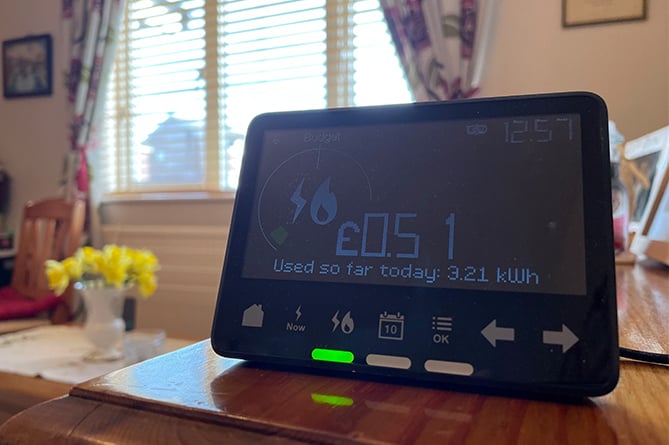FOR MONTHS, this column has repeatedly exposed a glaring injustice which is clobbering households in rural Wales with electricity bills £400 or £500 a year higher than justified.
Unless this scandalous anomaly is sorted out quickly, that excess could rise by hundreds of pounds more from this October.
That’s when the Ofgem energy price cap - the maximum suppliers can charge households - is predicted to rise by 65 per cent.
This of course would be on top of an unprecedented 54 per cent cap increase in April, which resulted in electricity prices in mid and north Wales rising on average by a monumental 40 per cent, considerably more than in other parts of Britain.
Since April, this column has been ramming home the message that the 40 per cent hike is almost three times higher than it should be given that the bulk of electricity - about 63 per cent - now comes from cheap renewables - wind, solar photovoltaic and hydro, and from nuclear plants, biomass and coal, with just 37 per cent or so generated by gas power-stations.
A simple calculation shows that, based on fuel mix used to generate electricity, the 40 per cent household electricity price rise in mid and north Wales from April should have been about 14 per cent, translating into bills lower by around £400 to £500.
People on stretched incomes, and energy consumers dependent on mains electricity because they’re off-grid for gas, need to know all this if they’re going to clamour for energy justice, if they’re going to rattle the cages of MPs and Senedd Members, who should all long ago have been looking beyond the parroted orthodoxy that continually rising energy prices are an unfortunate fact of life basically beyond remedy.
Certainly, the poor are being hung out to dry by politicians too sluggish to look deeper than the shamefully superficial press releases put out by the energy regulator, Ofgem, thus leaving themselves ill-equipped to take issue with, and to harangue, the UK Government on the fundamental cause of runaway electricity price rises.
But people are also being let down by Big Media, and in particular by public service broadcasters, notably the BBC, who equally are failing to probe.
Why have all these powerful voices not been shouting about the fact that electricity bills are being artificially, and seriously, inflated as a result of a little-known, and increasingly illogical, wholesale market convention that allows gas - the most expensive fuel - to set the price for all electricity generation?
Clearly, this archaic practice must be scrapped, because most electricity now comes from low cost renewables and from nuclear, not from expensive gas. Yet the cheapness of those renewables is not reflected in the elevated price households pay for electricity. And, as always, it is the poor, abandoned by the rich and vocal to the inhumanities of the market-place, who pick up the tab.
Finally, however, there is a sign that things may be moving in the right direction, with UK Government sources quoted by The Times pointing to an intention to cut this damaging connection between gas prices and electricity prices in order to reduce electricity bills for millions.
The strong suspicion must be that this reform will not be achieved quickly without maximum commitment and pressure from MPs, Senedd Members and the media. I’m not holding my breath.
The feeble squibs in our national media
SO WHY has Big Media been so supine, so wanting of fire its collective, well-fed belly, over the prospect of household energy bills leaping this autumn to close on £3,300 a year, and why, in particular, has it failed to spot and seize on the dire effect on bills of the long outdated coupling of gas prices and electricity prices ?
At one highly significant level, it’s very simple. The bulk of senior journalists and news presenters at the BBC, for example, who should be looking well beyond the simplistic lines fed them by energy companies and by the regulator, are reacting not, as they should, with the fizz of fireworks, but with the feebleness of damp squibs.
So what’s been holding them back? Fundamentally, their own astronomically high pay. Like the career politicians with whom they rub shoulders, they are so well off the anxiety and dejection of the increasing numbers of their viewers and listeners who are on, or approaching, the breadline are really of little interest.
The typical annual energy - gas and electricity - bill is now about £2,000 a year. That figure is set to rise to £3,240 a year from this October, and to £3,363 from January.
Such outgoings are chicken-feed for presenters and reporters working for BBC programmes such as Today, PM and Newsnight. None are paid less than about £250,000 a year, a good number £300,000 or more.
They will not themselves lose a moment’s sleep over rocketing energy bills, and the effort of will needed for them to identify with people facing a long winter in underheated, or literally unheated, homes is clearly not being made.
If they were personally struggling against the odds to make ends meet, or if they made themselves feel for the plight in which society’s underdogs find themselves, it would be a different story.
Then you might well have seen all the stops pulled out to expose the tale of our overheated electricity bills.




Comments
This article has no comments yet. Be the first to leave a comment.